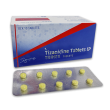
Zanaflex
Generic Zanaflex (Tizadinine) is a short-acting muscle relaxer. It works by blocking nerve impulses (pain sensations) that are sent to your brain. Tizanidine is used to treat spasticity by temporarily relaxing muscle tone.
| Package | Per pill | Savings | Price | Order |
|---|---|---|---|---|
| 30 pills | $ 1.19 | $ 35.60 | ||
| 60 pills | $ 0.97 | $ 13.02 savings | $ 58.18 | |
| 90 pills | $ 0.90 | $ 26.03 savings | $ 80.77 | |
| 120 pills | $ 0.85 | $ 40.25 savings | $ 102.15 | |
| 180 pills | $ 0.81 | $ 67.48 savings | $ 146.12 | |
| 270 pills | $ 0.80 | $ 104.90 savings | $ 215.50 |
Description
Tizanidine is used to relieve the spasms and increased muscle tone caused by multiple sclerosis (MS, a disease in which the nerves do not function properly and patients may experience weakness, numbness, loss of muscle coordination and problems with vision, speech, and bladder control), stroke, or brain or spinal injury. Tizanidine is in a class of medications called skeletal muscle relaxants. It works by slowing action in the brain and nervous system to allow the muscles to relax.
How To Take
Tizanidine comes as a tablet and a capsule to take by mouth. It is usually taken consistently either always with or always without food two or three times a day. Follow the directions on your prescription label carefully, and ask your doctor or pharmacist to explain any part you do not understand. Take tizanidine exactly as directed. Do not take more or less of it or take it more often than prescribed by your doctor. Tizanidine capsules may be opened and sprinkled on soft foods such as applesauce. Talk to your doctor before opening the capsules because the effects of the medication when used in this manner may be different than when swallowing the capsule whole. The medication in the capsule is absorbed differently by the body than the medication in the tablet, so one product cannot be substituted for the other. Each time you have your prescription filled, look at the tablets or capsules in the bottle and make sure that you have received the right product. If you think you received the wrong medication, talk to your doctor or pharmacist right away. Your doctor will probably start you on a low dose of tizanidine and gradually increase your dose, depending on your response to this medication.
Precaution
Before taking tizanidine, tell your doctor and pharmacist if you are allergic to tizanidine or any other medications. tell your doctor if you are taking ciprofloxacin (Cipro) or fluvoxamine. Your doctor will probably tell you not to take tizanidine if you are taking either of these medications. tell your doctor and pharmacist what other prescription and nonprescription medications, vitamins, nutritional supplements, and herbal products you are taking or plan to take. Be sure to mention any of the following: acyclovir (Zovirax); amiodarone (Cordarone, Pacerone); baclofen; cimetidine (Tagamet); clonidine (Catapres, Catapres-TTS); dantrolene (Dantrium); diazepam (Valium); famotidine (Pepcid, Pepcid AC); medications for anxiety, seizures, or high blood pressure; mexiletine (Mexitil); oral contraceptives (birth control pills); propafenone (Rythmol); fluoroquinolones such as gemifloxacin (Factive), levofloxacin (Levaquin), moxifloxacin (Avelox), norfloxacin (Noroxin), and ofloxacin (Floxin); ticlopidine (Ticlid); sedatives; sleeping pills; tranquilizers; verapamil (Calan, Covera, Isoptin, Verelan); and zileuton (Zyflo). Your doctor may need to change the doses of your medications or monitor you carefully for side effects. Other medications may also interact with tizanidine, so be sure to tell your doctor about all the medications you are taking, even those that do not appear on this list. tell your doctor if you have or have ever had kidney or liver disease. tell your doctor if you are pregnant, plan to become pregnant, or are breast-feeding. If you become pregnant while taking tizanidine, call your doctor. if you are having surgery, including dental surgery, tell the doctor or dentist that you are taking tizanidine.




















